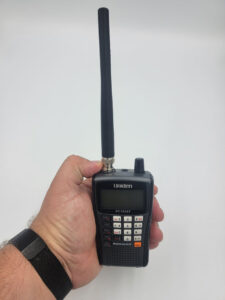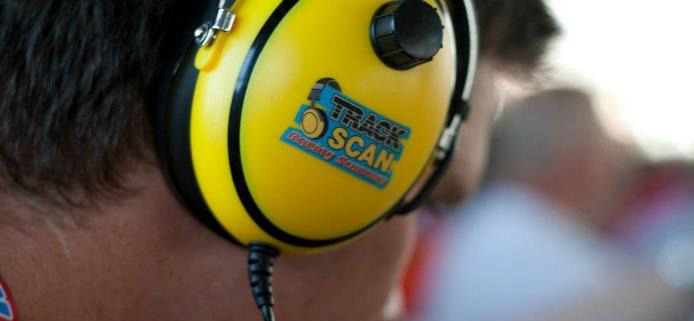You used to be able to rent scanners for the Indy 500. But a few years back, both Track-Scan and Racing Electronics parted ways with IndyCar. You can still find Racing Electronics at NASCAR events, but no IndyCar races. If you own your own Racing Electronics scanner, you can’t even get over-the-air programming that was once advertised as a feature of purchasing their equipment. You are left to program all the cars and drivers by hand.
So if you want to get in on the radio scanning game at the Indy 500 or other IndyCar races this year, it might be time to purchase your own scanner! While owning may sound like a lot of extra money and effort up front- they really do pay for themselves in just two or three races. Programming is VERY easy to do from your own computer- and if you forget to program it, there are features built into the radio to make track-side programming or scanning easy to do.
You will want to purchase the Uniden Bearcat BC125AT. This scanner has 500 memory channels, and they are divided into 10 “banks” (more on that later). This makes organizing them super easy, and scanning a breeze. At the time of this writing, the Bearcat BC125AT is about $120. It has everything you need for race day, except headphones or earbuds. Any regular wired earbuds will work here, and the scanner is loud enough in most instances to hear over the drone of race traffic. To be extra sure, you can get Earmuff hearing protection, that you could wear OVER your wired earbuds. Other extras to consider would be a splitter, so you can share your scanning with your child or friend. If you want the real nice (and expensive) over the ear headphones, I suggest the Howard Leight headphones. If you want to talk with your racing companion, there is a very expensive (but fantastic) set available on Amazon. But don’t let these headphone prices turn you away. Earbuds with cheap ear protection earmuffs are great for your first year scanning!

What I typically do is pull up the official spotters guide for the race, and put the frequency of each car on the channel that matches the car number. This makes switching to a known car super easy during the race. If you see a car you want to listen in to, just type in the number. Memorize a few of your favorite drivers for quick access when you’re ready.
The banks each hold 50 memories. So cars 1 through 50 will be in Bank 1, and 51-99 on Bank 2. I go a little further and often set “backup” frequencies on channels 101-199. (Banks 3 and 4) When the race starts, just hit scan- and it will stop whenever it gets to a channel that is transmitting. You can easily turn banks on and off by simply pressing the number that corresponds with the bank. This is also useful if you want to put track PA, safety crew, and race directors in a bank. I put mine in Bank 0, and then mostly leave that turned off during the race. I can still “direct-dial” to one of those channels, but my scanner doesn’t stop every time it comes around to the PA (which is mostly constantly on) When your scanner stops somewhere you want to hang around for a while, press the Hold button- and you’ll be there until you start scanning again.
Finally- if you are getting some strange noises on a channel, or have a car you wish to not listen to, you can press the Lockout button to STOP scanning that channel in the future. All lockouts are temporary, and will reset if you turn the scanner off and back on again. You can also double-press the lockout button to make the skipping of the channel permanent. You can always “direct-dial” a channel, even if it has been locked out.
I’ve written up a guide on the Bearcat BC125AT that covers all of these features and a few more, along with some great screenshots of programming, and a step-by-step scanning guide.
Indy 500 Car and Driver Radio Frequencies:
| Car # | Name | Frequency |
| 2 | Josef Newgarden | 464.9250 |
| 3 | Scott McLaughlin | 466.8250 |
| 5 | Pato O’Ward | 469.4375 |
| 06 | Helio Castroneves | 452.8000 |
| 6 | Felix Rosenqvist | 462.7875 |
| 7 | Alexander Rossi | 464.4625 |
| 8 | Marcus Ericsson | 457.0250 |
| 9 | Scott Dixon | 456.6500 |
| 10 | Alex Palou | 467.0375 |
| 11 | Takuma Sato | 466.1000 |
| 12 | Will Power | 466.2125 |
| 14 | Santino Ferrucci | 467.0750 |
| 18 | David Malukas | 467.2000 |
| 20 | Conor Daly | 469.1125 |
| 21 | Rinus VeeKay | 469.9250 |
| 23 | Ryan Hunter-Reay | 453.3750 |
| 24 | Graham Rahal | 461.0125 |
| 26 | Colton Herta | 467.4000 |
| 27 | Kyle Kirkwood | 469.1375 |
| 28 | Romain Grosjean | 469.3000 |
| 29 | Delvin DeFrancesco | 452.8500 |
| 30 | Jack Harvey | 468.2625 |
| 33 | Ed Carpenter | 467.7125 |
| 44 | Katherine Legge | 460.4250 |
| 45 | Christian Lundgaard | 466.3125 |
| 50 | RC Enerson | 459.4500 |
| 51 | Sting Ray Robb | 463.6000 |
| 55 | Benjamin Pedersen | 463.0125 |
| 60 | Simon Pagenaud | 461.0750 |
| 66 | Tony Kanaan | 456.1375 |
| 77 | Callum Ilott | 459.6500 |
| 78 | Agustin Canapino | 458.1000 |
| 98 | Marco Andretti | 468.4875 |





